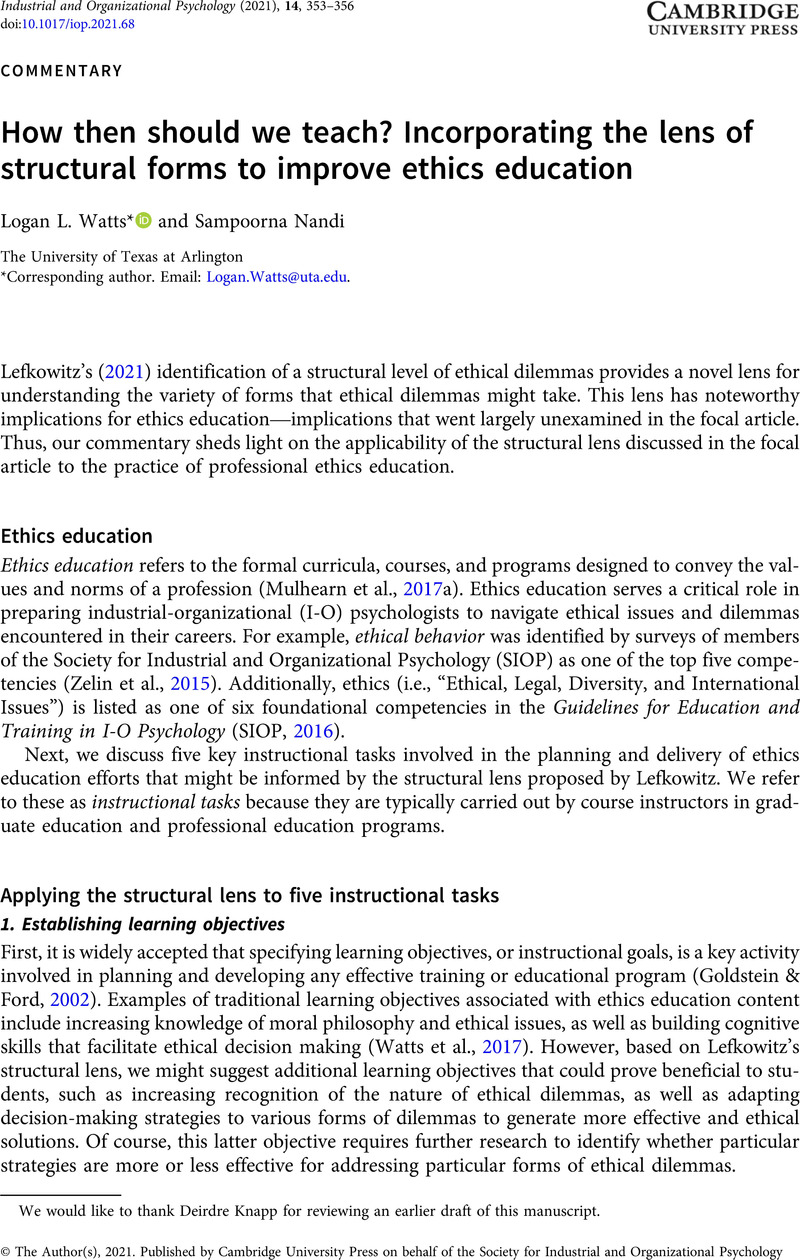No CrossRef data available.
Article contents
How then should we teach? Incorporating the lens of structural forms to improve ethics education
Published online by Cambridge University Press: 22 September 2021
Abstract
An abstract is not available for this content so a preview has been provided. Please use the Get access link above for information on how to access this content.

- Type
- Commentaries
- Information
- Copyright
- © The Author(s), 2021. Published by Cambridge University Press on behalf of the Society for Industrial and Organizational Psychology
Footnotes
We would like to thank Deirdre Knapp for reviewing an earlier draft of this manuscript.
References
Lefkowitz, J. (2017). Ethics and values in industrial-organizational psychology (2nd ed.). New York: Routledge.
Google Scholar
Lefkowitz, J. (2021). Forms of ethical dilemmas in industrial-organizational psychology. Industrial and Organizational Psychology: Perspectives on Science and Practice, 14(3), 297–319.Google Scholar
Lowman, R. L. (2006). The ethical practice of psychology in organizations. American Psychological Association.CrossRefGoogle Scholar
Medeiros, K. E., Watts, L. L., Mulhearn, T. J., Steele, L. M., Connelly, S., & Mumford, M. D. (2017). What is working, what is not, and what we need to know: A meta-analytic review of business ethics instruction. Journal of Academic Ethics, 15, 245–275.CrossRefGoogle Scholar
Mulhearn, T. J., Steele, L. M., Watts, L. L., Medeiros, K. E., Connelly, S., & Mumford, M. D. (2017a). Review of instructional approaches in ethics education. Science and Engineering Ethics, 23, 883–912.CrossRefGoogle ScholarPubMed
Mulhearn, T. J., Watts, L. L., Torrence, B. S., Todd, E. M., Turner, M. R., Connelly, S., Mumford, M. D. (2017b). Cross-field comparison of ethics education: Golden rules and particulars. Accountability in Research, 24, 211–224.CrossRefGoogle ScholarPubMed
Mumford, M. D., Connelly, S., Brown, R. P., Murphy, S. T., Hill, J. H., Antes, A. L., Waples, E. P., & Devenport, L. D. (2008). A sensemaking approach to ethics training for scientists: Preliminary evidence of training effectiveness. Ethics & Behavior, 18, 315–339.CrossRefGoogle ScholarPubMed
Mumford, M. D., Steele, L. M., & Watts, L. L. (2015). Evaluating ethics education programs: A multilevel approach. Ethics & Behavior, 25, 37–60.CrossRefGoogle Scholar
Society for Industrial and Organizational Psychology, Inc. (2016). Guidelines for education and training in industrial-organizational psychology. https://www.apa.org/about/policy/industrial-organizational-guidelines.pdf
Google Scholar
Steele, L. M., Mulhearn, T., Medeiros, K. E., Watts, L. L., Connelly, S., & Mumford, M. D. (2016). How do we know what works? A review and critique of current practices in ethics training evaluation. Accountability in Research, 23, 319–350.CrossRefGoogle ScholarPubMed
Todd, E. M., Torrence, B. S., Mulhearn, T. J., Watts, L. L., Connelly, S., & Mumford, M. D. (2017). Effective practices in the delivery of research ethics education: A qualitative review of instructional methods. Accountability in Research, 24, 297–321.CrossRefGoogle ScholarPubMed
Turner, M. R., Watts, L. L., Steele, L. M., Mulhearn, T. J., Torrence, B. S., Todd, E. M., Mumford, M. D., & Connelly, S. (2018). How did you like this course? The advantages and limitations of reaction criteria in ethics education. Ethics & Behavior, 28, 483–496.CrossRefGoogle Scholar
Watts, L. L., Medeiros, K. E., Mulhearn, T. J., Steele, L. M., Connelly, S., & Mumford, M. D. (2017). Are ethics training programs improving? A meta-analytic review of past and present ethics instruction in the sciences. Ethics & Behavior, 27, 351–384.CrossRefGoogle ScholarPubMed
Zelin, A., Lider, M., & Doverspike, D. (2015). SIOP Career Study executive report. Center for Organizational Research, The University of Akron. http://www.siop.org/tip/april15/techreport.pdf
Google Scholar


